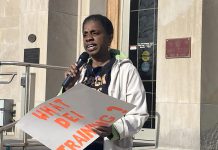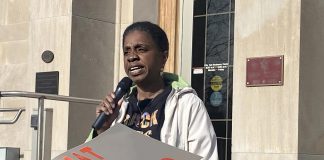
Have you ever received notice in the mail regarding the benefits of making burial arrangements for yourself? Have you subsequently done what many of us do: tucked that notice aside for consideration another day?
For many, planning for the inevitable gets in the way of living life in the now. And the younger one is, further down the pecking order is preparing for one’s death. After all, you’re healthy and life is good — it makes no sense to dwell on the finality that awaits you.
There will be time for that later, right?
Perhaps.
Members of the Peterborough Estate Planning Council, a non-profit organization dedicated to promoting the clear benefits of planning your estate now and doing so wisely, are advising us not to wait.
The council has declared June 20 to 25 as “Make A Will Week” and the message is simple: having a will ensures those who are left behind aren’t burdened by a lack of direction as to how your assets are to be disbursed.
“People either don’t think they have enough money to worry about making a will or they just don’t want to put their minds to it,” says lawyer Elizabeth Halka LLB, a partner with Lillico Bazuk Galloway Halka (163 Hunter Street West, Peterborough, 705-743-3577).
“Making a will is forward thinking. It’s trying to look after your kids and avoiding a huge headache. They’re dealing with not only grief. They’re dealing with all the financial hardship and then the possible costs of having to get a lawyer and the whole probate process. It’s time consuming and it’s difficult.”
“An estate with a proper will can be administered very quickly where if you have go through the court process, it could take months.”

“Look at the squandering of money that’s going to happen as a result,” she notes.
“You’ve illegitimate children coming forward claiming a share of the inheritance. Siblings are squabbling when they could be coming together as a family and celebrating his life.”
Fellow Peterborough Estate Planning Council member Kevan Herod CLU of Herod Financial Services (140 King Street, Suite 403, Peterborough, 705-741-5287) fully concurs.
The financial planner estimates that some 40 per cent of his clients either don’t have a will or, if they have a will, haven’t reviewed it for years.
“I think the reason why clients avoid making a will is because of the tough questions it forces them to ask”, Kevan says. “It’s ‘Yeah, I know I’ve got to do it but I don’t really want to do it’.”
“Without a will in place, you end up pitting one family member against another, or maybe one relative against four or five other relatives. It gets into mom or dad wanted me to have it and it gets pretty personal. It disrupts the family fabric, sometimes over relatively small things.”
The Peterborough Estate Planning Council, according to member and financial planner Greg Shaw CFP of Shaw Financial Services (569 Spillsbury Drive, Peterborough, 705-742-1776) is a one-stop shop in terms of brining together a host of professionals who can address all aspects of the estate planning process.
“Getting a will is absolutely critical,” explains Greg. “If that’s all people do, perfect .., but there’s a lot more to it and that’s the message we try to project.”
“The council tries to work as a group in terms of cross-referrals. It’s not a question of simply going to your lawyer and getting a will done. It’s a question of looking at your will as part of an integrated estate plan.”
To that end, members of the council include accountants, funeral service providers, lawyers, financial planning and life insurance advisors, and estate and trust consultants. As a group, their knowledge and expertise address virtually all aspects of estate planning.

Also in the mix are members from the charitable sector — among them Lesley Heighway, president and CEO of the Peterborough Regional Health Centre (PRHC) Foundation. Charities benefits greatly, and regularly, from monies bequeathed through wills.
“We call them legacy gifts,” says Lesley. “They’re some of the most important and special gifts that individuals make during their lifetime.”
“It’s a way that an individual or family can give back to their communities — in our case to ensure great health care is available in the future — in a way that may not have been possible during their lifetime.”
“The gift may be based on a care experience. It may be based on wanting to leave a legacy in their community, a legacy for their children, or to share their personal values with their family.”
Lesley notes council members “all work together. We work closely with estate lawyers and financial planners. If they (their clients) want to give back to their community, this is a perfect way to do it.”
Without a will, Lesley says you leave yourself open as to how your wealth will be disbursed as decisions are made on your behalf without your pre-stated input.
“Your social capital, per se, will be directed. It may not be directed in the way that you so choose. In other words, the government will direct it for you. This is a way for donors to choose.”
Legacy gifts, says Lesley, bring to light “so many heartwarming stories,” adding, “Anyone can do this. You don’t have to have significant wealth. This a way to direct what assets you have in a way that’s meaningful.”
“In each of the patient rooms, there is a motorized overhead lift. All of those lifts were funded by a donor who left a legacy gift. And there’s a rehabilitative courtyard for people who have had strokes and are learning how to walk again. Someone again left partial proceeds from an estate that were put towards that.”
For those without a will, as a starting point the council recommends a simple first approach to estate planning that brings order to what can be an overwhelming task.
It advises focusing your initial planning on four elements: the people in your life, the property you own, your plans for the future, and the person who will assist you in achieving your goals.

“If you don’t write your wishes down, the Government of Ontario is going to impose a will on you. A will is a beginning document; an outline of what you would really like to happen.”
Elizabeth paints a clearer picture.
“You’ve got investments, you’ve got real property, you’ve got stocks and bonds … capital gains are horrible,” she says.
“If you die without a will, even if you’re a millionaire, only the first $200,000 goes to your spouse. The rest goes to your kids.”
She adds, contrary to popular thought, it’s relatively inexpensive to have your will done: “It’s basically one hour of a lawyer’s time.” That, she notes, is chicken feed compared to what the costs of not having a will could be, and often are, in terms of court costs and probate fees.
Both Elizabeth and Kevan acknowledge that people can make their own will — in Ontario, it’s termed a holograph will — but they warn against that practice.
“The litigation lawyers love that. There’s a lot of contestability,” says Kevan, with Elizabeth noting “If it doesn’t have the necessary signatures or a prior affidavit of execution, it’s the same as having no will.”
Both also agree one of the most important decisions surrounding the making of a will is the choosing of an executor or estate trustee. First and foremost, that person must be someone you wholly trust to ensure your wishes are carried out as specified in your will.
“It’s really important to talk to the people that you want to be estate trustees,” advises Elizabeth.
“Sometimes they don’t want to do it. It’s a huge job. It’s kind of thankless too.”
While the goal of Make A Will Week is exactly what it states — to encourage those without a will to make one — a secondary message is recommending those with a will regularly review the document.
“As your assets change, if children are beneficiaries and they become ill or perhaps they’re in terrible marriages, you may want to have some sort of safety net for the spouse so he or she doesn’t end up losing whatever their inheritance could be,” advises Elizabeth, recommending a review every two years.
“We’re told there’s going to be major life change in very four years,” adds Kevan.
“Whenever there’s a major change, you may want to pull it out and review it and get it up to date. And the government is always going to change the rules somewhat, so that’s another reason to review it.”
“There are so many talented people on the Peterborough Estate Planning Council. There are insurance experts, there are tax experts, there are financial planning experts. There are a lot of ways you can save money if you put your mind to it, and preserve wealth for the future.”
If you have any questions about estate planning, about the role of the council in aiding you in your plans for the future, or about the roles of various professionals in your estate planning, visit www.estateplanptbo.com/estate-planning/.


























